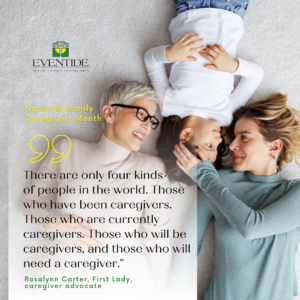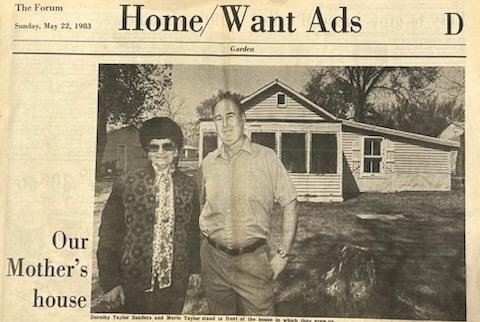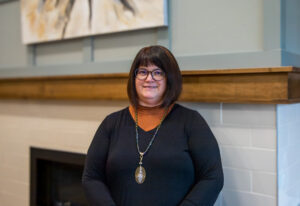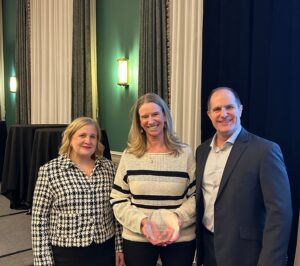Your mom falls and breaks her hip. You step in to take care of things at home while she recuperates.
Your nephew is diagnosed with a learning disorder. You take on extra tutoring in the evenings after dinner.
Your spouse develops dementia. You get support and learn how to manage activities of daily living.
Family members who become caregivers often do so without realizing it
Sometimes they also find themselves taking on the role unexpectedly after someone they care about has an accident or experiences a life-changing health diagnosis. And while becoming a caregiver isn’t typically on people’s bucket lists, it’s a role most (if not all) of us will take on at some point in our lives.
November is National Family Caregivers Month and the organization, Caregiver Action Network, which leads awareness efforts on a national level, has designated this year’s theme as #CaregivingHappens.
Being a caregiver changes the game of life, to be sure. But there are reasons to celebrate this role in your life if or when you find yourself in the position of helping improve someone else’s quality of life (or need help yourself).
#CaregivingHappens, and we want you to see the joy and fulfillment in the experience along the way
We often hear family caregivers say they “have to” do this or that for a loved one. Yet, our challenge to caregivers this month is to reframe their way of thinking by saying they “get to” help someone they love have better years, months, days, hours and minutes.
As First Lady and activist Rosalynn Carter said, “There are only four kinds of people in the world. Those who have been caregivers. Those who are currently caregivers. Those who will be caregivers, and those who will need a caregiver.”
Here are some of so many reasons to celebrate getting to be a caregiver
You get to spend extra time with someone you love
Your caregiver role may have you spending extra time in the car with a loved one to help with errands or getting to and from appointments. Make good use of that time by striking up a conversation, reminiscing about a favorite memory or singing along to the radio. You’ll never regret having a good time with someone you love.
You get to help make someone’s day a little easier
It might seem simple to you — vacuuming a rug, changing light bulbs or organizing a closet — but these little tasks may be difficult or impossible for the person you’re caring for. Never underestimate the smallest task you do for another person, because you never know how much it’s needed at the time. Plus, you’re keeping someone you care about safe when you take care of maintenance or cleaning chores for them.
You get to make sure a loved one’s likes, needs and preferences are met
If your caregiving skills extend to helping someone live well with a neurodegenerative disease or other life-changing illness, chances are you’ll find yourself answering questions on behalf of your loved one. However, you’re just the person to let other care partners know your loved one’s needs and preferences, like favorite foods, taste in music and clothing choices. This is part of ensuring your loved one lives with dignity and respect for their individuality no matter what their abilities might be. Be happy you got to know these details about them because most of the rest of the world doesn’t!
You get to advocate for someone who may not be able to on their own
In more extensive caregiving roles, you may find yourself with power of attorney rights or having to make sure a loved one is receiving maximum benefits to support their care needs. As an advocate, you are a powerful voice for someone who needs one. Feel powerful because you are.
You get to learn more about yourself than you ever thought possible
One of the best side benefits of being a caregiver is you get to learn so much about yourself. Maybe you weren’t always patient in your life, but now you’ve learned to slow down, be in the moment a little more, because being a caregiver requires patience. Or maybe you learned what you yourself want or don’t want should you find yourself needing a caregiver some day. This is all good information to have as you plan your future and collaborate with those who may care for you in the years to come.
You get to love
Perhaps the most important role as a caregiver? To love. Caregiving is hard work, but it is meaningful and fulfilling work. Even if they do not or cannot express their appreciation and love for how you take care of them, the person you care for is grateful for you. Be grateful for yourself for showing up and supporting someone else when they most need you.
Learn more about #CaregivingHappens
Visit the Caregiver Action Network to explore many caregiver tips and resources.




